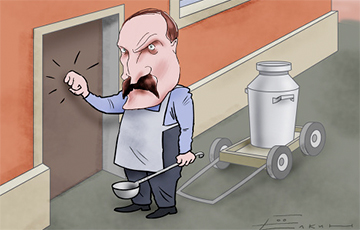Lukashenka Got Tough Response From Russia
37- 17.05.2018, 11:59
- 134,328

Rosselkhoznadzor did not to shy away from imposing new sanctions against Belarusian enterprises.
On May 14, at the Supreme Eurasian Economic Council meeting, Lukashenka apparently took a dig at Rosselkhoznadzor saying that "the interests of individual commodity producers are periodically placed above the decisions we have taken," udf.by writes.
But Rosselkhoznadzor did not abandon the tough measures. On May 15, its website published information on how Belarusian producers bypass the sanctions with the help of the false Belarus-Kazakhstan transit scheme. And on May 16, Rosselkhoznadzor imposed restrictive measures against a new number of Belarusian dairy and meat enterprises. And among them was the JSC Aleksandryjskaye – a former collective farm in Lukashenka’s homeland.
This situation looks like the department’s distance response to the head of Belarus. What is more here – politics or economics?
"Russia will purchase neither our milk, nor dairy products and meat"
Strategy analytical center head Leanid Zaika has explained the Russian side’s logic.
"When the formula of the Customs Union work was worked out, it was said that governments would not subsidize economic entities. The Belarusians were not to send 15% of the budget to support agriculture. And since they did not stop doing it, Russia decided to go the other way and force Belarusian enterprises to move up with the help of competition and sanitary measures," – Leanid Zaika says.
The economist draws attention to the fact that because of its conflict with the West, Russia took the path of development of its agro-industrial complex. And now they enter the final straight on self-production.
"We must get rid of the illusions that the Russian market will always be ours. Russia will purchase neither our milk, nor dairy products and meat. Our price is not good there anymore. I was in Russia a month ago: Belarusian dairy products were not seen there," – Leanid Zaika says.
In the current situation, the Belarusian authorities should act in two directions, the economist believes.
"Guys, make a good laboratory, which will conduct analysis of products up to the level of DNA. Compete, develop new types of goods. Be engaged in diversification of commodity markets. On the other hand, it is necessary to reduce the production of food products and deal with IT, robots and 3D printers – something that the Russians do not have. Quit your whining," – Leanid Zaika says.
The economist considers Lukashenka's approach naive:
"The Belarusian president is an agrarian himself, and very often their attitude to their job is very simple. They think that if something is produced, then it will be necessarily eaten. No, guys, it used to be like that. And now it will be as follows: although it has been produced, but nobody will want to take it because of the competitors."
"If it was about political obstacles, Lukashenka would have made things hum"
Economist Leu Marholin believes that there’s a minimum of politics in the Rosselkhoznadzor sanctions.
"Given the persistence of the claims to Belarus’ dairy enterprises, and the fact that most often specific enterprises are taken, and not all at once, it is probably worth concluding that there is more economy in this situation, than politics. More precisely, not even economy, but sanitary norms," – the economist said.
Aliaksandr Lukashenka’s actions confirm this idea.
"If there were only political obstacles for Belarusian products, I think that, with his energy, Lukashenka would have made things hum much more actively," – Leu Marholin said.
In the meantime, there is only the Belarusian leader’s statement made at Sochi summit that some certain people do not want to implement state agreements.
"I think that there are serious violations on the part of Belarusian manufacturers. Haven't a leg to stand on. It is difficult to eliminate violations, because the technologies at our enterprises are outdated. Our sanitary services check state producers in a regimen of moderation – not as it would be with private traders. It seems to me that the problem really exists and Rosselkhoznadzor simply reacts to it," – the economist said.
At the same time, he does not rule out that they check Belarusian goods more meticulously than the Russian ones.
"But it is understandable: nobody wants to import something not very decent from abroad, even from the best friends," – Leu Marholin said.









